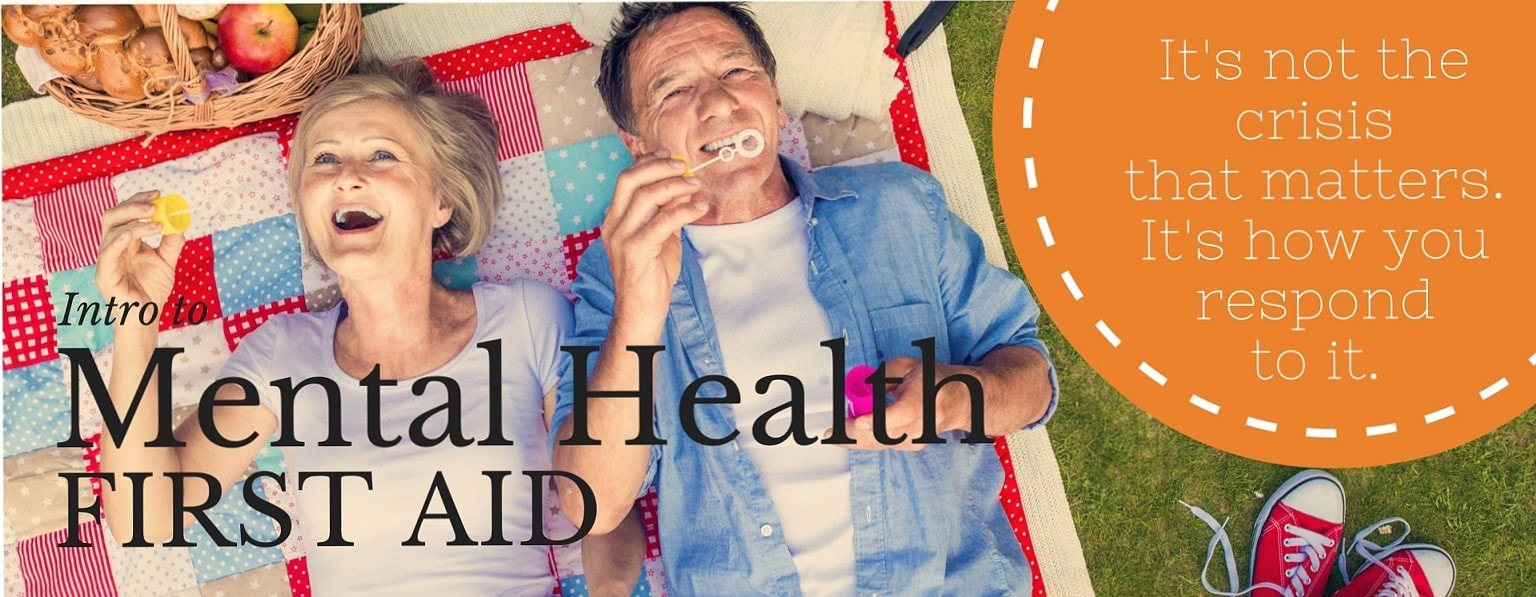 This is the title of a just published article by the Mental Health Commission of Canada. This article really resonated for me so instead of writing my own blog, I thought I would provide you with some of the highlights. Here goes!
I hope you have found these tips helpful. Listening Non-Judgmentally is one of the six action steps of Mental Health First Aid. Why not join one of my many Virtual Course offerings to learn more. Hope to see you soon!
0 Comments
As I was running some errands one day, in the town where I live, I was driving around the side of the grocery store in my van. I saw a young man crossing the parking lot and walking toward the entrance. By now I was driving beside him and to my surprise, he starting yelling and cursing at me, screaming at the top of his lungs, “Were you going to %$#@%$ hit me?”
I didn’t know what to do. In an instant, I could feel the anger and resentment boil up inside me. “I wasn’t going to hit him! I saw him!” I thought about rolling down my window and yelling back. Should I honk my horn at him or just drive away mad? For a moment, I couldn’t think. Then I decided to take a deep breath and try a different approach. I rolled down my window, gave the young man the most empathetic, apologetic look that I could muster and I said “I am so, so sorry. That must have been so frightening for you. I did see you and I didn’t mean to scare you. Are you ok?” Instantly, his body language changed. First he looked completely shocked, his jaw dropped and he stood motionless. Then he softened and said “Oh my gosh no, I am so sorry. I am so sorry for screaming at you……. It’s just that I’ve been hit by a car before and…. I am so sorry.” As he continued to explain I quickly realized that he may have been experiencing some post-traumatic stress due to his accident. We bantered apologies back and forth for a few minutes and then both smiled and wished one another a good day. I share this story every time I teach Mental Health First Aid Certification. I remind people that mental health problems affect one in three Canadians, so we are likely interacting with people who are struggling every day. This story illustrates a few of the concepts that participants learn in the course. Mental Health First Aid (MHFA) is a powerful act of compassion – caring about others’ pain and using presence and connection can have a profound impact. Mental Health First Aid, like Physical First Aid training is not rocket science. The skills are easy for anyone to learn…and just like physical first aid…it can save lives. I teach participants to recognize signs and symptoms of mental illness in four areas: mood disorders, anxiety, addiction and substance abuse and psychotic illness. Unlike blocked arteries or broken bones, mental illness is shrouded in stigma. People are reluctant to talk about it and, when confronted with someone in crisis, few know what to do. MHFA allows people to be confident to have that conversation. You don’t have to be a passive bystander, struggling for words or paralyzed by ignorance. By learning some simple skills, you can become a mental health first responder. Mental Health First Aid, governed by the Mental Health Commission of Canada, is an evidence based, interactive, 12- hour course for ANYONE and no previous mental health experience is necessary. It can benefit teachers, health care professionals, emergency service workers, human resource professionals, employers, managers and supervisors, parents, community groups and the public. In fact, over 200,000 people in Canada have been certified since 2011. The course is now taught in 23 countries around the world. Not only is MHFA catching on and gaining momentum nationally and globally, it’s catching on right here in our own backyard. Since January 2014, I have provided almost 50 training sessions and certified over 800 participants. Most of these events have taken place right here in Muskoka. Here’s what fellow Muskokan’s are saying about the course: “WOW – incredible. By far the most valuable course I have taken in my lifetime. I am so grateful for the opportunity to have experienced this.” “Truly inspiring and worth all the time. Thank you! Great work!” “I feel much more able and confident to respond to mental health issues that may arise at school or within the community.” Just as a first aid kit doesn’t replace doctors and hospitals; MHFA isn’t a substitute for professional mental health care. While physical first aid provides training on strains, fractures and bleeding, mental health focusses on things like panic attacks, psychotic episodes and acute stress reactions. Today, in Canada, mental illness is the leading cause of disability. The disease burden of mental illness is 1.5 times that of all cancers combined. Mental illness can cut a person’s life expectancy by 10-20 years. Tragically, we lose 11 people every day in Canada due to suicide. We lose our children, our friends, our brothers and sisters, our neighbors and our colleagues. The economic burden of mental illness in Canada is estimated to be 51 billion dollars every year. We can no longer afford to just idly stand by. I believe Mental Health First Aid can make a difference. I believe that if we were all trained we could turn the tides together. As humans, we are built to fear that which we do not understand. Fear leads to avoidance. Avoidance leads to stigma. People fear those with mental illness and addiction because as a society we do not have a good understanding of them. Mental Health First Aid provides an understanding….and the skills - so that we can BE understanding. Human connection reduces fear…and that’s why MHFA works! What are you waiting for? Join us and become certified! Upcoming Courses in Muskoka: Recently, I read an article in the New York Times by author and journalist “David Bornstein, entitled “Protecting Children from Toxic Stress.”
“Imagine if scientists discovered a toxic substance that increased the risks of cancer, diabetes and heart, lung and liver disease for millions of people. Something that also increased one’s risks for smoking, drug abuse, suicide, teen pregnancy, sexually transmitted disease, domestic violence and depression – and simultaneously reduced the chances of succeeding in school, performing well on a job and maintaining stable relationships? We would do everything in our power to contain it and keep it far away from our children right?” The author goes on to discuss that there is such a thing and it’s called “toxic stress”. Researchers are now showing us that it is the chronic nature of stress that causes consequences to accumulate over time and contribute to illness such as diabetes, cardiovascular disease, cancer, mental illness and addiction. In children, the effects of toxic stress can be much worse. Exposure to toxic stress weakens the part of the child’s brain that deals with learning, reasoning and emotions. Toxic stress stunts the healthy development of the brain and is strongly associated with lifelong health and social problems. Stress response or the “fight or flight” response evolved in humans over hundreds of thousands of years and is basically a response intended to give us the short burst of energy we needed to save our lives from a threat such as a sabre tooth tiger. Once we have killed or fled from the tiger and the threat is gone we return to a calm physical state. However, when stress becomes chronic, it also becomes toxic. Toxic stress response can occur when a child experiences strong, frequent, and/or prolonged adversity. Such adversity can include physical or emotional abuse, chronic neglect, parental substance abuse or mental illness or exposure to violence. Toxic stress can also be experienced by the accumulated burdens of family economic hardship—poverty, excessive academic and/or athletic demands, punitive, harsh discipline practices, parental separation or divorce. Studies show that youth today are suffering from rising levels of stress, anxiety, depression and even suicide. It’s important if we can, to reduce the circumstances which cause toxic stress. While prevention of toxic stress is best, it can be very difficult to change the environments that produce major stress for families, such as poverty. We now know however, that a powerful mitigating factor is connectedness, nurturing and support. Research shows that, even under stressful conditions, supportive, responsive relationships with caring adults as early in life as possible can prevent or reverse the damaging effects of toxic stress response. (Centre for Developing Child, Harvard University) While adverse circumstances can elevate the body’s stress response, social emotional supports by caring adults such as parents, caregivers and teachers have a powerful effect to return the stress system back to normal. Why does something as simple as social emotional support and connection reduce toxic stress? The answer is surprisingly simple. When a baby is born, do they experience stress? Yes. When they are hungry, tired or uncomfortable, they experience stress and cry. A baby is born with the capacity to experience stress but does not yet have the capacity or the brain development to “self-regulate” that stress. In other words, they are not able to calm themselves –adults do it for them. Every time an infant cries we pick them up, soothe, cuddle and rock them and assist them to return the stress system back to normal. In a child’s first months and years, this ritual takes place often many times a day and perhaps thousands of times over the first five years of life. This creates a very firmly established brain connection that says “If I feel stress, the presence of a nurturing, human caring relationship is going to help me relieve that stress.” According to Darcy Lowell, an associate clinical professor at Yale University School of Medicine, “Children can be shielded from the most damaging effects of stress if their parents are taught how to respond appropriately. One thing that is highly protective is the quality of the relationship between the parent and child. “ The Muskoka Strengthening Families program capitalizes on that protective factor. Strengthening families is a unique family program where parents and their children work together to strengthen the quality of their relationships. Parenting can be extremely rewarding but also can very difficult and most parents would admit that some extra support and assistance is a welcomed opportunity. Strengthening Families is an evidence based program that was originally developed in the United States. The Canadian program began implementation in the year 2000. Muskoka was one of the first sites to implement the program in Ontario and is believed to be the longest ongoing program in Canada 13 years later. Muskoka Strengthening Families program is a hidden gem. Our community has enjoyed 13 years of growing success as our partnership strengthens and we continue to grow and learn. Ten reasons why Strengthening Families works!
|
AuthorSuzanne Witt-Foley Archives
January 2021
Categories |

 RSS Feed
RSS Feed
